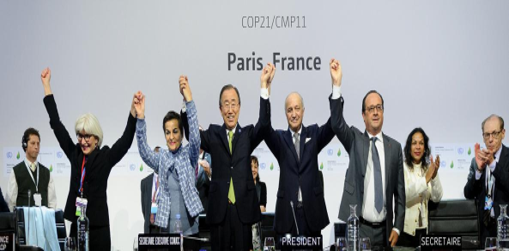UNITED NATIONS
The United Nations established the “United Nations Framework on Climate Change” in 1994 to stabilize greenhouse gas concentrations at a level that would prevent dangerous human-induced interference with the climate. The UN Framework Convention on Climate Change (UNFCCC) sets out the basic legal framework and principles for international climate change cooperation with the aim of stabilizing atmospheric concentrations of greenhouse gases (GHGs) to avoid “dangerous anthropogenic interference with the climate system.”
To boost the effectiveness of the 1992 UNFCCC, the Kyoto Protocol was adopted in December 1997. It committed industrialized countries and countries in transition to a market economy to achieve quantified emissions reduction targets for a basket of six GHGs. The Kyoto Protocol’s first commitment period took place from 2008 to 2012. The 2012 Doha Amendment established the second commitment period from 2013 to 2020.
PARIS AGREEMENT 2015
In December 2015, parties adopted the Paris Agreement, which requires all parties to determine, plan, and regularly report on the nationally determined contribution (NDC) that it undertakes to mitigate climate change.

The commitments made at the Paris agreement included:
- To keep global temperatures “well below” 2.0C… limit “them to 1.5C”
- Reaching a peak in greenhouse emissions “as soon as possible“ – net-zero
- To review each country’s contribution to cutting emissions every five years
- For rich countries to help poorer nations by providing “climate finance”
GLASGOW COP 26
In November 2021 the United Kingdom hosted the latest international conference – COP 26. It is notable that so many different countries participated in this, from China and Russia, through to the USA. However it was observed that the major oil polluting countries – Australia, Brazil, Russia and Saudi Arabia – continue to obstruct progress and at Cop26, yet again, they and the other backers of the fossil fuel-powered status quo outgunned supporters of the immediate decarbonisation that is needed, if the goal of limiting temperature rises to 1.5C is to stay within reach. There was a major discussion about the role of coal in future, and the final report saw India at the last-minute insisting that a reference to “phasing out” coal be changed to “phasing down”. That shows a lack of commitment to climate change.
If Glasgow goes down in history as a failure, it will be because emissions keep on rising. This would mean that the world’s richest countries and organisations made the choice of “the path of greed and selfishness”. We will collectively have chosen not to protect the world’s poorest people and places from catastrophic climate harms – including sea level rises that are engulfing island states, and humanitarian disasters caused by extreme weather events, and temperatures that will make large areas of the planet uninhabitable. We need to decide whether it is morally and ethically right to allow this to happen.
The Paris agreement committed the world to limiting temperature rises to no more than an average of 1.5C above the industrial average from 1850 to 1900. Based on current commitments, we are on track for 2.4C. We have a long way to go.
COP 27 – EGYPT
The 27th Conference of Parties (CoP27) to the United Nations Framework Convention on Climate Change (UNFCCC) will be held in Sharm el-Sheikh, Egypt 06-18 November 2022. The expectations from the event — termed ‘African CoP’, ‘Adaptation CoP’ and ‘Implementation CoP’ — depending on who you ask, are high, and much hope rests on the unity and strength of voices from the developing world to fight for what they deserve. The key will be the conference’s success in helping the poorer nations to mitigate the impact of climate change, particularly across Africa, and progress on taking action n getting onto a pathway that leads to 1.5C warming.